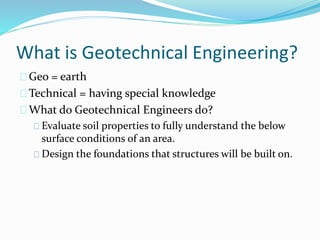Top Guidelines Of Geotheta
Table of ContentsNot known Facts About GeothetaUnknown Facts About GeothetaThe Geotheta StatementsMore About GeothetaGeotheta - An Overview

They conduct site investigations, gather examples, perform lab examinations, and examine data to review the suitability of the ground for building projects - Tailings Engineer. Based upon their findings, geotechnical designers offer referrals for structure layout, incline stability, maintaining frameworks, and reduction of geotechnical dangers. They work together with other experts, such as architects, architectural engineers, and building and construction teams, to make certain that geotechnical factors to consider are integrated right into the total task layout and implementation
By assessing the behavior and properties of dirt and rock, they can identify possible geotechnical hazards such as landslides, dirt negotiation, or incline instability. Their knowledge helps avoid failures or mishaps that can jeopardize lives and property. Below are some thorough obligations and duties of a geotechnical designer: Website Examination: Geotechnical designers conduct site investigations to gather data on subsurface problems.
They interpret the information to comprehend the properties and habits of the dirt and rock, including their strength, permeability, compaction characteristics, and groundwater problems. Geotechnical Evaluation and Layout: Geotechnical engineers evaluate the information collected during site examinations to analyze the stability and viability of the website for building and construction tasks. They execute geotechnical estimations and modeling to review variables such as birthing ability, settlement, incline security, lateral earth stress, and groundwater circulation.
The Main Principles Of Geotheta
Foundation Design: Geotechnical engineers play a vital role in designing foundations that can safely support the desired structure. They examine the dirt problems and tons requirements to establish the ideal foundation kind, such as shallow foundations (e.g., footings), deep structures (e.g (https://www.easel.ly/browserEasel/14498559)., stacks), or specialized techniques like soil renovation. They take into consideration factors such as settlement restrictions, birthing ability, and soil-structure communication to establish ideal foundation designs
They review construction strategies, screen website activities, and conduct area examinations to confirm that the style suggestions are complied with. If unforeseen geotechnical concerns emerge, they examine the situation and provide suggestions for remediation or changes to the style. Danger Evaluation and Reduction: Geotechnical engineers analyze geotechnical threats and threats related to the project site, such as landslides, liquefaction, or dirt erosion.

Collaboration and Communication: Geotechnical designers work very closely with various other professionals entailed in a job, such as architects, structural designers, and building groups. Efficient interaction and partnership are vital to integrate geotechnical factors to consider into the total job style and construction procedure. Geotechnical engineers give technical know-how, solution queries, and make certain that geotechnical demands are met.
Not known Incorrect Statements About Geotheta
Right here are some sorts of geotechnical designers: Foundation Engineer: Structure engineers focus on designing and assessing foundations for structures. They examine the dirt problems, lots requirements, and site qualities to figure out one of the most suitable foundation type and layout, such as superficial structures, deep structures, or specialized strategies like pile structures.
They review the factors influencing incline security, such as dirt homes, groundwater conditions, and slope geometry, and develop techniques to avoid slope failures and mitigate risks. Earthquake Engineer: Earthquake designers focus on assessing and designing structures to stand up to seismic forces. They examine the seismic danger of a site, review dirt liquefaction capacity, and develop seismic layout standards to make certain the safety and security and strength of structures throughout quakes.
They perform field testing, accumulate examples, and assess the gathered data to characterize the dirt residential or commercial properties, geologic formations, and groundwater conditions at a website. Geotechnical Instrumentation Designer: Geotechnical instrumentation engineers focus on monitoring and gauging the habits of soil, rock, and frameworks. They install and preserve instrumentation systems that keep an eye on aspects such as soil negotiation, groundwater degrees, incline movements, and architectural displacements to evaluate efficiency and offer early cautions of possible concerns.
5 Simple Techniques For Geotheta
They perform tests such as triaxial examinations, combination examinations, direct shear examinations, and permeability examinations to gather data for geotechnical evaluation and style. Geosynthetics Designer: Geosynthetics engineers focus on the layout and application of geosynthetic products, such as geotextiles, geogrids, and geomembranes. They make use of these products to boost soil security, enhance slopes, supply drainage solutions, and control erosion.
They often tend to be investigative individuals, which suggests they're intellectual, introspective, and analytical. They wonder, systematic, logical, analytical, and rational. A few of them are also social, indicating they're kind, charitable, participating, patient, caring, helpful, compassionate, sensible, and friendly. Does this audio like you? Take our totally free occupation examination to learn if geotechnical designer is Tailings Engineer just one of your leading occupation suits.
In the office environment, geotechnical engineers utilize specialized software application tools to carry out calculations, create layouts, and analyze information. They prepare records, evaluation project specifications, connect with customers and group members, and coordinate task activities. The office setup provides a favorable environment for study, evaluation, and collaboration with various other experts included in the job.
Geotheta Things To Know Before You Buy
They often visit job websites to carry out site investigations, analyze geotechnical problems, and gather data for evaluation. These sees include taking a trip to different places, sometimes in remote or difficult terrains. Geotechnical designers may do soil tasting, conduct examinations, and monitor building tasks to ensure that the geotechnical facets of the project are being carried out properly.
Geotechnical designers likewise work in specialized geotechnical labs. Geotechnical laboratory designers work extensively in these environments, taking care of screening tools, running tools, and taping data.